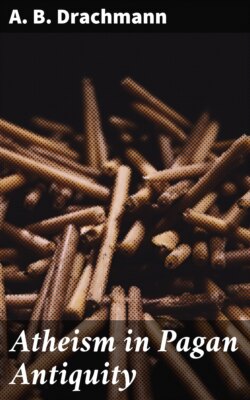Atheism in Pagan Antiquity

Реклама. ООО «ЛитРес», ИНН: 7719571260.
Оглавление
A. B. Drachmann. Atheism in Pagan Antiquity
Atheism in Pagan Antiquity
Table of Contents
Chapter IV
Chapter V
Chapter VI
Chapter VII
Chapter VIII
Chapter IX
Notes
Index
Отрывок из книги
A. B. Drachmann
Published by Good Press, 2020
.....
With the Critias fragment we have also brought to an end the inquiry into the direct statements of atheistic tendency which have come down to us from the age of the sophists. The result is, as we see, rather meagre. But it may be supplemented with indirect testimonies which prove that there was more of the thing than the direct tradition would [pg 051] lead us to conjecture, and that the denial of the existence of the gods must have penetrated very wide circles.
The fullest expression of Attic free-thought at the end of the fifth century is to be found in the tragedies of Euripides. They are leavened with reflections on all possible moral and religious problems, and criticism of the traditional conceptions of the gods plays a leading part in them. We shall, however, have some difficulty in using Euripides as a source of what people really thought at this period, partly because he is a very pronounced personality and by no means a mere mouthpiece for the ideas of his contemporaries—during his lifetime he was an object of the most violent animosity owing, among other things, to his free-thinking views—partly because he, as a dramatist, was obliged to put his ideas into the mouths of his characters, so that in many cases it is difficult to decide how much is due to dramatic considerations and how much to the personal opinion of the poet. Even to this day the religious standpoint of Euripides is matter of dispute. In the most recent detailed treatment of the question he is characterised as an atheist, whereas others regard him merely as a dialectician who debates problems without having any real standpoint of his own.
.....